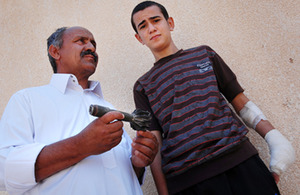Making Misrata safer with MAG: clearing unexploded ordnance in Libya
How a British charity is helping communities recover from conflict

Mohamed pictured with his father Abdul, and the tail-fin of the grenade that cost him his left hand. Picture: Sean Sutton/MAG
A year ago, Libya was in throes of a violent conflict. Now, a fragile peace and normality is beginning to return. Fifteen year old children like Mohamed can play with a football in the streets of Misrata again.
But Mohamed was playing with something much more dangerous this time last year - part of a rifle grenade that had landed near his house. He picked it up off the street thinking it was safe, but it exploded in his bedroom. He lost most of his left hand.
Mohamed is one of a growing number of people in Libya who have fallen victim to unexploded ordnance (UXO) - grenades, land mines, rockets and ammunition - all grim remnants of the conflict which gripped the country for much of 2011.
High levels of abandoned and dangerous UXO still litter the towns and roads where fighting took place. Without professional disposal and adequate understanding of the dangers many people, especially children, remain at risk of serious harm.
“Children are particularly attracted to 23mm bullets as they are in abundance and easy to pick up,” said Alexandra Arango, who works as a Community Liaison Manager for British charity MAG (Mines Awareness Group), who specialise in clearing land mines and other UXO in former conflict zones around the world.
“Most children play with them for a while until they decide to throw rocks at them or tap them onto a surface and they explode, injuring their hand and causing shrapnel injuries on their chest or face.”
With support from the UK government and other donors, MAG began working in Libya last April, to carry out initial assessments, before establishing operations in May to conduct Explosive Ordnance Disposal around the coastal area of Ajdabiya, Brega and Misrata.
Key to MAG’s work has also been the development of Physical Security and Stockpile Management (PSSM) operations. PSSM makes safe the leftover weapons and munitions, preventing them falling into the wrong hands.
The importance of awareness
MAG also carried out assessments in the Nafusa Mountains, in the west of the country, towards the border with Tunisia. Working with UNHCR, they also provided Risk Education to Libyan refugees in Tunisia ensuring that, as they returned to their homes, they were aware of the risks represented by UXO and were able to help reduce the risk to themselves and their families.
MAG have also established Community Focal Points (CFPs) - groups made up of a representative range of men, women and young people - in the most contaminated areas in and around Zintan. The CFPs deliver targeted risk education and also help gather information on dangerous areas. This assists clearance operations, ensuring that MAG focuses their resources in the areas where the need is greatest.
More than 48,000 people have so far benefited directly or indirectly from MAG’s Risk Education work.
MAG disposal teams have destroyed more than 100,000 remnants of conflict, including anti-personnel landmines, anti-tank mines, cluster submunitions, UXO items and small arms ammunition. MAG has cleared nine schools in and around Ajdabiya and Brega, and seven in Misrata, as well as houses, roads and other public areas.
They have recorded 8,275 direct beneficiaries from clearance, and more than 350,000 indirect beneficiaries, in Misrata, Ajdabiya, Brega and Benghazi.
Mohamed’s father, Abdul said: “Everyone in this area knows about this accident and everyone now tells their children not to touch these things. We didn’t know before but we certainly do now”.
There is still much to do before Libya becomes safe enough for communities to develop and thrive socially and economically.
Until then, MAG’s clearance and risk education operations will continue to work towards creating a platform for peace and stability, supporting wider humanitarian and post-conflict reconstruction efforts.
Mines, ammunition, cluster bombs and other unexploded remnants of war continue to pose to thousands of Libyans.
The UK is supporting MAG and the UN Mine Action Service (UNMAS) to help identify and dispose of unexploded material and prevent death and injury to local people. UK support will help protect over one million people from the dangers of these devices.
More than mines: supporting mine action
Landmines and explosive remnants of war (ERW) continue to kill and maim approximately 4,000 people a year in nearly 80 countries or territories, primarily in Africa, Asia, Central America, the Middle East and the Balkans.
They affect development by making land and other renewable resources unusable for growing food or generating income, and blocking market routes and infrastructure development projects. Landmines and ERW jeopardise efforts to improve health and education and reduce poverty, and therefore prevent countries achieving the Millennium Development Goals.
But mine action entails more than removing landmines from the ground. It includes actions ranging from teaching people how to protect themselves from danger in a mine-affected environment to advocating for a mine-free world.
Find out more about our work on mines and mine action.